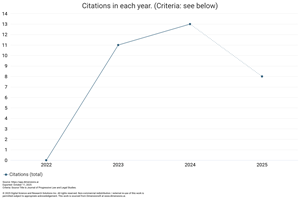Urgency of Legal Protection for Religious Scholars in Articles on Blasphemy from the Perspectives of Criminology and Victimology
DOI:
https://doi.org/10.59653/jplls.v2i02.687Keywords:
Protection, Blasphemy, Criminology, Progressive Law, Legal StudiesAbstract
The urgency lies in the ambiguous definition, which allows this article to be interpreted in various ways and potentially forces anyone into the realm of criminal law. This is found in Article 156a, which states that anyone who deliberately expresses sentiments or performs acts essentially hostile, abusive, or blasphemous against a religion practiced in Indonesia shall be punished with imprisonment for a maximum of 5 years in public. The phrase "in public" is the subject of debate and could render the article ambiguous, allowing it to be used to target anyone desired to fulfill the criteria. The purpose of this research is to prevent the continued use of this ambiguous article for personal or group interests, and to stop the criminalization of speakers using this provision.
Downloads
References
Akbar, M. (2017). Analysis of Law Enforcement of Blasphemy Crimes (Study of Circular Letter of the Chief of Police SE/06/X/2015).
Bambang Waluyo, Victimology (Witness and Victim Protection), Sinar Grafika, Jakarta, 2011
Catello, R. (2023). Who gave historical criminology a name? A history of 20th-century historical criminology. Journal of Criminal Justice, 85. https://doi.org/10.1016/j.jcrimjus.2022.101954
Channing, I., Churchill, D., & Yeomans, H. (2023). Renewing Historical Criminology: Scope, Significance, and Future Directions. In Annual Review of Criminology (Vol. 6). https://doi.org/10.1146/annurev-criminol-030421-035516
Crouch, M. A. (2012). Law and religion in Indonesia: The constitutional court and the blasphemy law. Asian Journal of Comparative Law, 7(1). https://doi.org/10.1515/1932-0205.1391
Efendi, R. (2020). Regulation of tapin district no. 15 of 2016 concerning the management and protection of traditional markets (Doctoral dissertation, Islamic University of Kalimantan MAB).
Griffin, E., A First Look at Communication Theory (8th ed.; S. Gouijnstook, Ed.). New York: David Patterson, 2012
H. Zainuddin Ali, 2009, Legal Writing Methods, Sinar Grafika, Jakarta
Hasani, I., & Halili, H. (2022). Human Rights and Constitutionality Issues of Blasphemy Law in Indonesia. Jurnal Konstitusi, 19(2). https://doi.org/10.31078/jk1927
Hendriyani, & Dharmawan, Y. P, Introduction to Public Speaking, 2011
Indrayanti, K. W., & Saraswati, A. A. A. N. (2022). Criminalizing and penalizing blasphemy: the need to adopt a human rights approach in the reform of Indonesia’s blasphemy law. Cogent Social Sciences, 8(1). https://doi.org/10.1080/23311886.2022.2104704
Iva, T. (2018). Law Enforcement Against Blasphemy Crimes Through Social Media in the Jurisdiction of Pekanbaru District Court (Doctoral dissertation, Law Faculty, S. 2).
Lintang, L. C., Martufi, A., & Ouwerker, J. W. (2021). The Alternative Concepts of Blasphemy Law in Indonesia: Legal Comparison with Ireland and Canada. Bestuur, 9(1). https://doi.org/10.20961/bestuur.v9i1.51632
Mahfud MD, (2010), Legal Politics in the National Legal System, Varia Peradilan, Vol. XXV
Olson, J. (2023). Positive Criminology and Positive Psychology. Criminal Justice Policy Review, 34(1). https://doi.org/10.1177/08874034221133727
Peter Mahmud Marzuki, 2008, Introduction to Legal Science (Jakarta: Kencana Prenada Media.
Peter Mahmud Marzuki, 2008, Legal Writing, 4th edition, Kencana, Jakarta Rakhmat, J. (2013). Psychology of Religion: An Introduction. Mizan Pustaka.
Pratiwi, C. S. (2021). Rethinking the Constitutionality of Indonesia’s Flawed Anti-Blasphemy Law. Constitutional Review, 7(2). https://doi.org/10.31078/consrev724
Rakhmat, J. (2021). Psychology of Religion. Mizan Publishing.
Siddik, S. (2022). The Origin of the Indonesian Blasphemy Law and its Implication towards Religious Freedom in Indonesia. Tebuireng: Journal of Islamic Studies and Society, 3(1). https://doi.org/10.33752/tjiss.v3i1.3648
Soerjono Soekanto and Sri Mahmudji, 1988, Normative Legal Writing, Rajawali Press, Jakarta
Soesilo, R. (1995). Criminal Code (KUHP): Along with Complete Commentary Article by Article.
Susanto, I.S., Criminology, Genda Publishing, Yogyakarta, 2011
Zolecha, C. A. (2017). Legal Protection for Creditors of Chattel Securities Indicated Not Owned by Debtors (Doctoral dissertation, Sebelas Maret University).
Downloads
Published
How to Cite
Issue
Section
License
Copyright (c) 2024 Abshoril Fithry, Sjaifurrachman Sjaifurrachman

This work is licensed under a Creative Commons Attribution-ShareAlike 4.0 International License.
Authors who publish with this journal agree to the following terms:
- Authors retain copyright and grant the journal right of first publication with the work simultaneously licensed under a Creative Commons Attribution-ShareAlike that allows others to share the work with an acknowledgement of the work's authorship and initial publication in this journal.
- Authors are able to enter into separate, additional contractual arrangements for the non-exclusive distribution of the journal's published version of the work (e.g., post it to an institutional repository or publish it in a book), with an acknowledgement of its initial publication in this journal.
- Authors are permitted and encouraged to post their work online (e.g., in institutional repositories or on their website) prior to and during the submission process, as it can lead to productive exchanges, as well as earlier and greater citation of published work (See The Effect of Open Access).
























